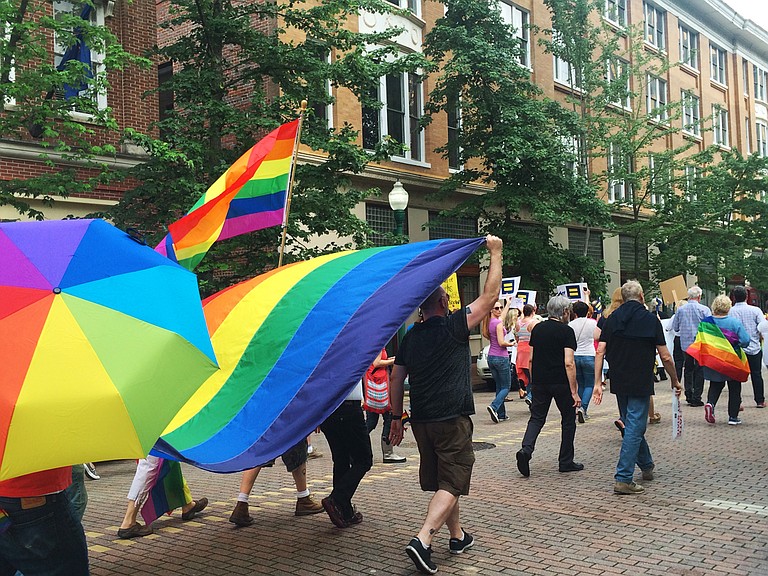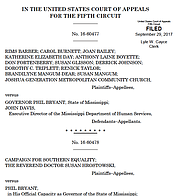House Bill 1523 sparked statewide protests and never became state law in 2016, but now it could this week after 5th U.S. Circuit Court of Appeals judges decided with a vote of 12-2 to not review the case before its full panel. Photo by Arielle Dreher.
Monday, October 2, 2017
JACKSON — House Bill 1523, the law Gov. Phil Bryant signed that can allow Mississippians acting on their religious beliefs to discriminate against LGBT citizens, is set to become state law this Friday—unless the 5th Circuit U.S. Circuit Court of Appeals decides differently. The 5th Circuit voted to deny a rehearing in Barber v. Bryant, the case against the "Protecting Freedom of Conscience from Government Discrimination Act," late on Sept. 29.
The law protects Mississippians, from circuit clerks to physicians, from government discrimination if they act according to their religious belief or moral conviction that "marriage is or should be recognized as the union of one man and one woman; sexual relations are properly reserved to such a marriage; and male (man) or female (woman) refer to an individual's immutable biological sex as objectively determined by anatomy and genetics at time of birth."
Critics call the legislation the "nation's most sweeping anti-LGBT law," while supporters of the bill argue it protects religious freedom of Mississippians.
Attorneys for Mississippians who challenged the bill plan to ask the 5th Circuit for a stay, to maintain the status quo, and not allow HB 1523 to become state law, while they appeal to the U.S. Supreme Court.
"Even if you are ... asking the Supreme Court to take the case, that in and of itself does not stop the law from taking effect," Susan Sommer, a Lambda Legal attorney who is helping represent the Barber plaintiffs, told the Jackson Free Press this morning.
Sommer said attorneys for the Barber plaintiffs plan to ask the 5th Circuit to stay the mandate that would enable HB 1523 to become law, likely tomorrow—but if the 5th Circuit does not issue a stay, the law takes effect Friday.
Rob McDuff, the lead attorney for several plaintiffs in the Barber v. Bryant case, also announced that they will petition the U.S. Supreme Court to review the case.
"This is an unfair and unconstitutional law, and we are taking our claim to the Supreme Court," McDuff said in a press release. "People should not have to live through discrimination in order to challenge it."
After attorneys file the petition before the Supreme Court, it could be weeks before plaintiffs know whether or not the high court will consider the case.
"Our hope would be that it might be possible for the Supreme Court to hear this case in this coming term," Sommer told the Jackson Free Press.
HB 1523, which the Republican supermajority supported in the Mississippi Legislature in 2016, did not become law initially after several Mississippians brought two lawsuits against Gov. Phil Bryant after he signed the bill. U.S. District Court Judge Carlton Reeves blocked the bill from becoming state law, but Gov. Phil Bryant and Mississippi Department of Human Services Director John Davis, both named defendants in the case, appealed to the 5th Circuit.
A three-judge panel of 5th Circuit judges reversed Reeves' ruling back in June but did not rule on the merits of the case. The only legal question is whether or not the plaintiffs have standing to bring the lawsuit.
"The plaintiffs have not shown an injury-in-fact caused by HB 1523 that would empower the district court or this court to rule on its constitutionality," the June 2017 three-judge opinion said. The court did not shut down the possibility of further litigation where plaintiffs could prove that they suffered injury due to the bill's implementation. The plaintiffs petitioned the court for a full re-hearing on the question of standing, but on Friday, the majority of judges polled voted against a re-hearing by a vote of 12-2. Two judges dissented the decision, saying the Mississippi plaintiffs do have standing.
"The plaintiffs' allegations are thus sufficient to establish their standing to bring a challenge under the Establishment Clause," Judge James Dennis wrote in his dissent. "This conclusion is consistent with the holdings of at least two of our sister circuits, which have recognized that stigmatic harm caused by government policies or regulations to individuals within their own political community is sufficient to establish standing for purposes of the Establishment Clause."
Roberta Kaplan, lead attorney for the Campaign for Southern Equality and their plaintiffs, said in a press release that the 5th Circuit's decision was limited to the question of standing only.
"It's important to remember that the Fifth Circuit's decision, while deeply disappointing, was limited to the question whether we had sufficiently alleged standing under the Establishment Clause," Kaplan said in a press release. "The only court decision on the merits is the decision of Judge Reeves at the district court, which held HB 1523 to be unconstitutional, which it clearly is. So stay tuned. Rest assured that we will do everything humanly possible to continue to fight this harmful law on the merits in order to protect our nation's constitutional values and the LGBT citizens of Mississippi."
This story will be updated. Read more about HB 1523 and its journey from the statehouse to the courthouse at jfp.ms/HB1523.



Comments
Use the comment form below to begin a discussion about this content.
Sign in to comment
Or login with:
OpenID